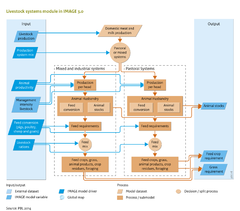Livestock systems/Description: Difference between revisions
Jump to navigation
Jump to search
No edit summary |
No edit summary |
||
| Line 17: | Line 17: | ||
# animal products; | # animal products; | ||
# foraging including roadside grazing, scavenging household waste, and feedstuffs from backyard farming. | # foraging including roadside grazing, scavenging household waste, and feedstuffs from backyard farming. | ||
In pastoral ruminant production systems, the feed is almost entirely grass except in developing regions where foraging constitutes a larger but variable proportion of the total feed. Pigs and poultry are fed on food crops and by-products, crop residues and fodder. Since these animals are mainly farmed in mixed systems, the contribution of food crops and residues to the total feed in these systems is much higher than in pastoral systems. | |||
The required feed crop production per animal is calculated from feed rations, and this information is incorporated into the Agricultural Economy Demand model ([[Agricultural Economy and forestry]]). The proportion of grass in feed rations determines total grass consumption, which is used to compute the grassland area per world region, based on grazing intensity ([[Agricultural Economy and forestry]] and [[Agricultural systems]]). | The required feed crop production per animal is calculated from feed rations, and this information is incorporated into the Agricultural Economy Demand model ([[Agricultural Economy and forestry]]). The proportion of grass in feed rations determines total grass consumption, which is used to compute the grassland area per world region, based on grazing intensity ([[Agricultural Economy and forestry]] and [[Agricultural systems]]). | ||
Scenario definition: A scenario includes assumptions on milk production per animal for dairy cattle, carcass weight and off-take rate for beef cattle, pigs, poultry, sheep and goats, and feed conversion rates (FCR) for pigs, poultry, sheep and goats. The changes in these parameters are generally based on the storyline of the scenario, and on the economic growth scenario. | Scenario definition: A scenario includes assumptions on milk production per animal for dairy cattle, carcass weight and off-take rate for beef cattle, pigs, poultry, sheep and goats, and feed conversion rates (FCR) for pigs, poultry, sheep and goats. The changes in these parameters are generally based on the storyline of the scenario, and on the economic growth scenario. | ||
}} | }} | ||
Revision as of 14:46, 10 February 2014
Parts of Livestock systems/Description
| Component is implemented in: |
| Components: |
| Related IMAGE components |
| Projects/Applications |
|
| Models/Databases |
| Key publications |
| References |
